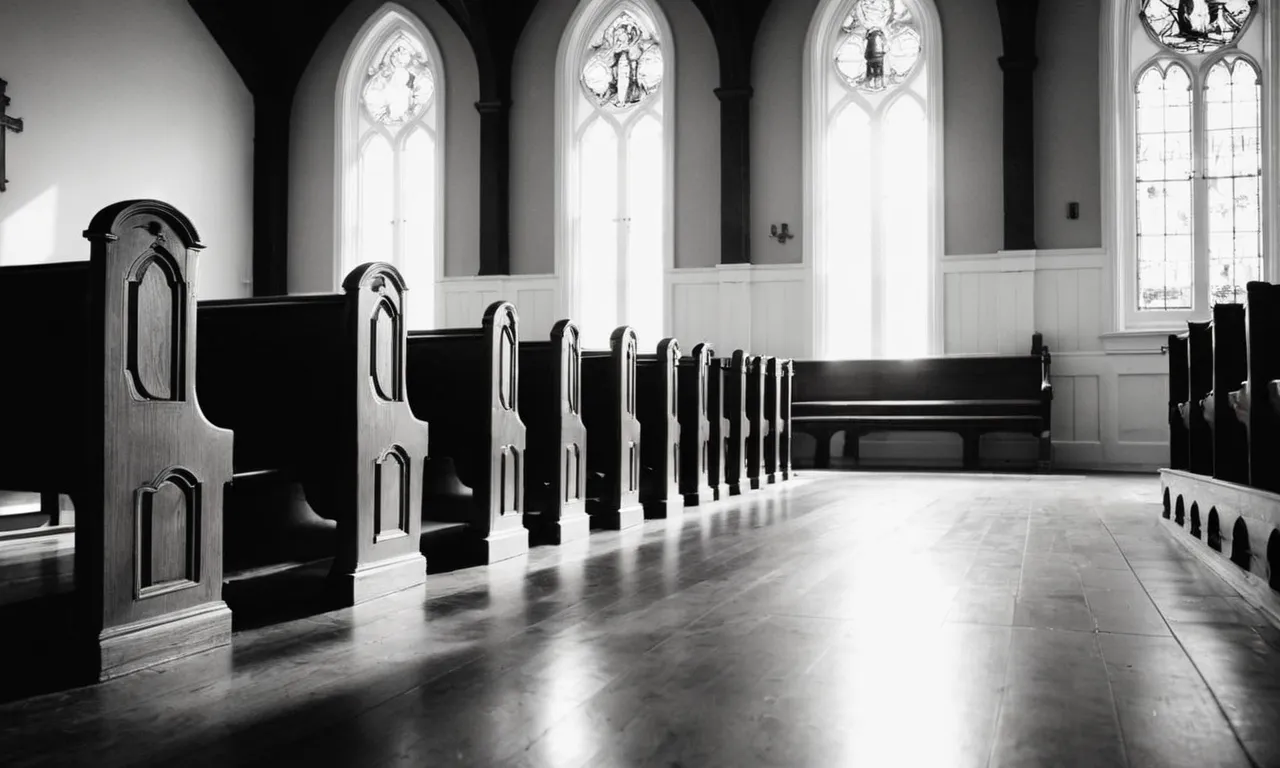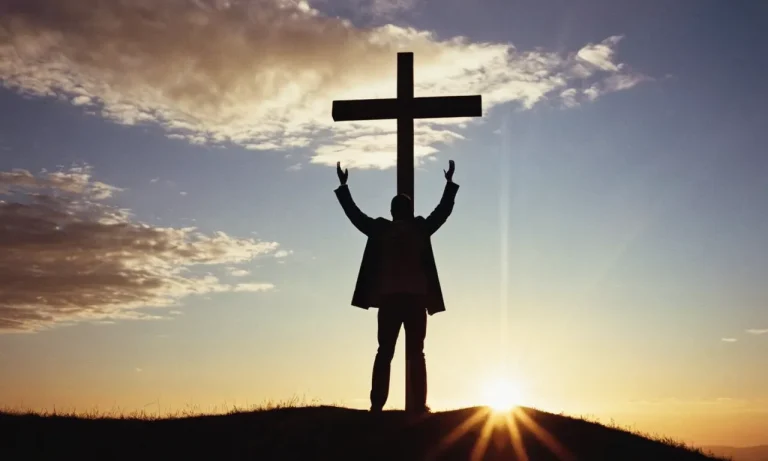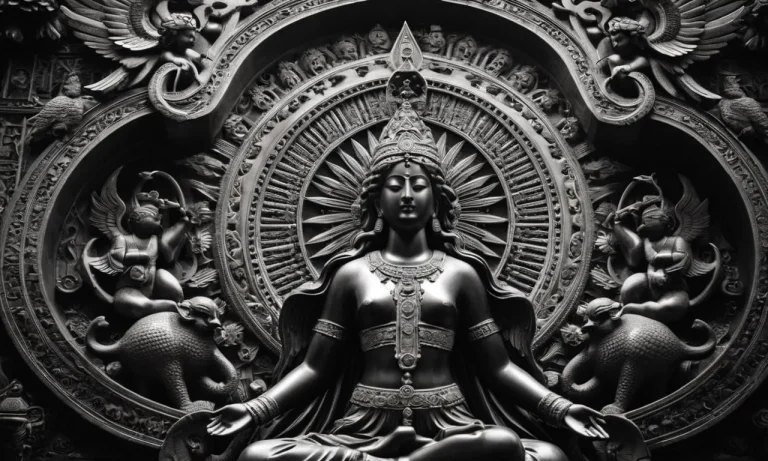What Happened To God: A Comprehensive Look At The Fate Of Deity
The question of what happened to God is one that has perplexed humanity since ancient times. With the decline of organized religion in modern society, many now wonder if God still exists and what role, if any, the divine plays in our lives.
If you’re short on time, here’s a quick answer to your question: While the concept and role of God has evolved over human history, most evidence suggests that God did not definitively ‘go’ anywhere. Many still believe in God or some kind of higher power, though these beliefs have adapted to modern scientific understanding and more secular worldviews.
In this comprehensive article, we will examine the changing concept of God across different eras and belief systems. We will analyze the reasons behind the shifting perspectives on deity and spirituality.
By the end, you will have a nuanced understanding of what happened to the notion of God and the spiritual fate of humanity.
The Concept and Role of God in Ancient Societies
Polytheistic and Henotheistic Beliefs
In ancient societies, most cultures practiced polytheism – the worship of multiple gods. Each god was associated with different aspects of life, such as war, fertility, the sun, the harvest, etc. These early pantheons consisted of both male and female deities.
The gods were anthropomorphic, possessing human personalities and flaws. Myths explained how the gods created the world and humanity. Rituals and sacrifices were conducted to honor the gods and earn their favor.
Examples of ancient polytheistic religions include those of the Egyptians, Greeks, Romans, and Norse.
Henotheism is the worship of one god without denying the existence of others. Many ancient societies evolved from polytheism to henotheism, focusing their worship on one supreme creator god while still acknowledging other deities.
For instance, in ancient Egypt, different cult centers worshipped their own patron gods, although all recognized Ra as the sun god. Henotheism was a transitional stage towards monotheism in some areas.
Monotheism and the Abrahamic God
Monotheism is the belief in a single deity. The shift from polytheism to monotheism marked a radical change in ancient religions. Judaism was likely the first monotheistic religion in the ancient world, worshipping Yahweh as the one true god.
Christianity and Islam later traced their origins back to the God of Abraham. These Abrahamic religions conceived of God as eternal, omnipotent, omniscient, and omnibenevolent. God was the supreme creator deity who made a covenant with humankind.
Monotheism strongly shaped Western civilization and still predominates globally today.
Early Interactions Between Deity and Humans
Ancient religions depicted active relationships between gods and humans. Gods frequently interacted directly with people or mediated through priests and oracles. Myths told lively stories of gods disguising themselves to mingle among mortals.
Deities demanded worship and sacrifice from their human subjects and punished transgressions. At the same time, they acted as benefactors who bestowed favors on individuals or societies that pleased them. Temples were built as houses for the gods.
Rituals sought to appease divine wrath or gain the gods’ blessing. Some rulers in the ancient Near East even proclaimed their legitimacy by claiming divine descent or approbation. Thus, the divine was an intimate presence shaping daily human existence.
The Decline of Organized Religion and Rise of Secularism
The Enlightenment and Scientific Revolution
The Enlightenment era of the 17th and 18th centuries emphasized reason, science, and critical thinking over faith, tradition, and religion. Thinkers like Voltaire and David Hume levied philosophical criticisms against organized religion, while scientists like Galileo and Newton discovered laws of nature that questioned biblical teachings.
This intellectual movement laid the foundations for secular societies where church and state were separated. As education and scientific thinking spread, literal interpretations of religious texts weakened while atheist and humanist worldviews strengthened.
Increasing Diversity of Worldviews
In the 20th century, the diversity of philosophical and religious thought increased drastically. Eastern religions like Buddhism and Hinduism spread globally, while New Age spirituality and even atheist humanism saw rising popularity.
As the menu of worldviews expanded, traditional religions faced growing competition. Rather than monopolizing society, they became consumer options selected based on individual preference.
| 1900 | 80% affiliated with Christianity or Islam |
| 2000 | 65% affiliated with Christianity or Islam |
This table shows the declining market share of the dominant monotheistic faiths over the 20th century.
Criticisms of Religion’s Role in Society
“New Atheist” critics like Richard Dawkins and Sam Harris argue organized religion encourages ignorance, oppresses social progress, and has been the cause of much violence and conflict throughout history.
While some counter that secular regimes in the 20th century were even more oppressive, organized religion has faced growing scrutiny over its social and political influence.
As developing countries become more educated and progressive, analysts predict the non-religious portion of the world population could rise to over 25% by 2050.
Persisting Belief in the Divine in the Modern Era
Belief in God or Higher Power Today
Despite the rise of science and secularism, surveys consistently show that a majority of people worldwide still believe in God or some higher power. For example, a 2022 Gallup poll found that 81% of U.S. adults believe in God.
This percentage has only gradually declined over the past decades, showing the persistence of faith. Reasons for continued belief include upbringing, personal spiritual experiences, finding meaning and purpose, and belief that the universe must have a creator.
Additionally, most believers say God loves all people, wants them to be good, is all-knowing and all-powerful. Thus, God remains a pivotal force providing hope, comfort and moral guidance for the majority today.
Adapting Faith to Science and Reason
Many of the faithful have adapted their beliefs to accommodate modern scientific theories and rationalist critiques. For example, only about 1 in 4 Americans take the Bible literally today, while nearly half see it as the inspired word of God.
Likewise, many believers accept evolution as God’s method of creation. These more moderate views allow science and religion to coexist for many. Some progressive believers have also updated doctrines on social issues like gender roles and sexuality to align with modern humanistic values.
While skeptics may see this flexibility as a weakness, it has enabled faith to adapt and thus persist into the scientific age.
Seeking Spirituality Outside Organized Religion
An increasing number of Americans, especially young adults, are leaving organized religion while still seeking spiritual growth and community. A Pew study in 2022 found that nearly 4 in 10 Americans feel “very spiritual,” professing beliefs like feeling connected to nature and finding inner purpose, even if they don’t attend religious services.
Reasons for this exodus from traditional faiths include disillusionment with rigid doctrine, church scandals, and the perception that religion is intolerant. The rise of yoga, meditation, retreats, nature spirituality and other practices shows the enduring human need for spiritual meaning, community and self-development in the modern age.
The Role and Relevance of God in a Secular World
Is God Dead or Just Different?
The concept of God has undergone seismic shifts in the modern secular age. While organized religion’s influence has waned in many parts of the world, personal spiritual beliefs persist. Rather than the traditional notion of an all-powerful deity that intervenes in human affairs, many espouse a more abstract sense of a higher power or divine cosmic consciousness.
Surveys indicate that 90% of Americans still believe in God or a universal spirit, though definitions vary widely. This suggests that God still occupies an important psychological and philosophical role for most people, even if traditional religious affiliations have declined.
As philosopher Charles Taylor argues, belief remains strong but the significance and practice around it has been reimagined in contemporary society.
Can Spirituality and Reason Coexist?
The rise of secular rationalism in the Enlightenment era led many to conclude that science and faith occupy opposing spheres, and that the advance of human knowledge would inevitably undermine religious belief.
The continued prevalence of faith, however, suggests spirituality fulfills enduring human needs that empirical facts may not satisfy.
74% of scientists in the U.S. express some form of religious belief, according to Pew research. This indicates spirituality and reason can meaningfully coexist in modern life. Einstein famously argued science can only ascertain what is, not what should be, suggesting morality requires some extra-scientific foundation that faith could provide.
Humanistic philosophies like secular Buddhism also aim to foster ethics and meaning without supernaturalism.
New Approaches to the Divine in Philosophy
While the New Atheists make a forceful case against traditional notions of God, new philosophical approaches suggest alternative frameworks for grounding ethics and purpose. These include panpsychism, the theory that consciousness is universal and the essence of reality, as well as cosmopolitanism and emergentist conceptions of morality.
Thinkers like David Ray Griffin and Philip Clayton have developed sophisticated “panentheistic” understandings of God, seeing divinity as embodied in the interconnectedness of the universe rather than a separate supernatural entity.
This maintains an integral place for the divine while syncing with modern science’s non-dualistic worldview. The wide appeal of Pope Francis likely owes something to this more inclusive, pluralistic angle as well.
What God Means Now Versus Through History
The concept of God has evolved significantly throughout human history. In ancient times, gods were seen as powerful supernatural beings that controlled natural forces and human destiny. Polytheistic religions like those of the Greeks, Romans, Egyptians and Norse worshipped multiple gods, each with control over a specific domain like the sun, love, war, etc.
These gods were anthropomorphic, exhibiting human qualities like jealousy, anger and love.
With the rise of monotheistic faiths like Judaism, Christianity and Islam, the view of God became centered around a single all-powerful, omniscient deity. God was seen as the supreme creator and law-giver.
The Judeo-Christian God transcended human understanding, though still intervened directly in earthly affairs. Worship of God was mandatory, and following His commandments was central to salvation and avoiding divine wrath.
In modern times, especially in the West, conceptions of God have changed substantially. With the Enlightenment and the rise of science, God became less interventionist and anthropomorphic. Deism depicted God as a distant creator who set the universe in motion but did not alter its predetermined course.
Spirituality became more individualistic, with people seeking their own connection with the divine.
Today, many conceive of God in non-anthropomorphic terms, as an impersonal force or ground of being. Others embrace a multiplicity of spiritual energies or supernatural beings. Atheism and agnosticism have risen, viewing God as an outdated concept lacking evidentiary support.
Yet traditional notions of God persist, especially among the morally concerned and spiritually inclined.
In many ways, one’s view of God aligns with one’s view of the universe and humanity’s place within it. As knowledge advances and cultures evolve, people continually reimagine the divine to fit their circumstances and understanding.
God remains central to humanity’s quest for meaning, ethics and transcendence. Though interpretations differ radically, the sense of awe and reverence the concept evokes seems universal. The exact nature and role of God continues to inspire reflection, debate and faith across cultures.
Conclusion
The concept of God has undergone profound shifts across human history, adapting to new perspectives brought by scientific discovery, social change, and globalization. While organized religion does not hold the authority it once did, many still feel an innate spirituality and sense of the divine in everyday life.
Rather than definitively dying or disappearing, God transformed along with the human experience. Deity persists for many but often in reinterpreted ways that allow room for reason and secular values. The question of what happened to God reveals as much about the evolution of humanity as it does about the fate of the divine.







